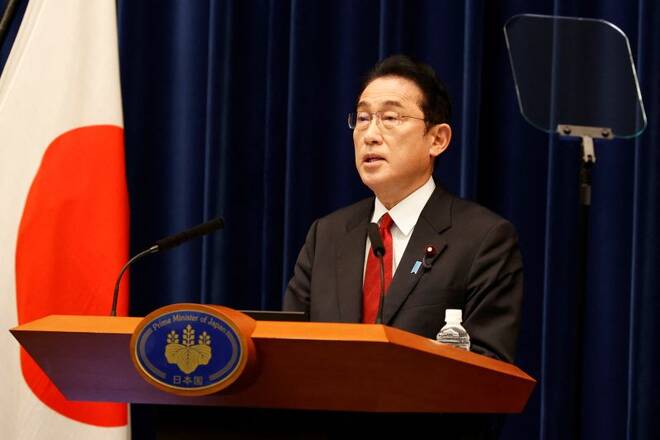Advertisement
Advertisement
Japan’s cenbank is not aiming to manipulate currency, PM says
By:
By Leika Kihara TOKYO (Reuters) -Japanese Prime Minister Fumio Kishida said the central bank's monetary policy is aimed at achieving its 2% inflation target, not at manipulating currency rates, brushing aside the view the country must end an ultra-low interest rate policy to stem sharp yen declines.
By Leika Kihara
TOKYO (Reuters) -Japanese Prime Minister Fumio Kishida said the central bank’s monetary policy is aimed at achieving its 2% inflation target, not at manipulating currency rates, brushing aside the view the country must end an ultra-low interest rate policy to stem sharp yen declines.
Kishida also said the recent rise in domestic inflation was due mostly to a global spike in crude oil and raw material costs, rather than the weak yen.
“The Bank of Japan (BOJ) is conducting monetary policy to achieve its 2% inflation target, not to manipulate currency rates,” Kishida told parliament, when asked by an opposition lawmaker about the relationship between the yen’s declines and the central bank’ prolonged ultra-loose policy.
“The government hopes the BOJ continues to strive toward achieving its inflation target, with an eye on economic, price and financial developments,” he said on Friday.
The yen slumped to a fresh 20-year low of 126.56 against the dollar on Friday, as investors focused on the gap between the U.S. Federal Reserve’s aggressive rate hike plans and the BOJ’s pledge to maintain its ultra-low policy for the time being.
While a weak yen boosts Japanese exports, it inflates import costs for energy and food products that have already seen prices jump due to the war in Ukraine.
Some lawmakers have blamed the BOJ’s ultra-easy policy for accelerating yen declines and adding pain to households and firms by pushing up living costs.
Under a policy dubbed yield curve control, the BOJ pledges to guide short-term rates at -0.1% and cap long-term borrowing costs around 0% to fire up inflation to its 2% target.
(Reporting by Leika Kihara; Editing by Himani Sarkar and Kim Coghill)
About the Author
Reuterscontributor
Reuters, the news and media division of Thomson Reuters, is the world’s largest international multimedia news provider reaching more than one billion people every day. Reuters provides trusted business, financial, national, and international news to professionals via Thomson Reuters desktops, the world's media organizations, and directly to consumers at Reuters.com and via Reuters TV. Learn more about Thomson Reuters products:
Did you find this article useful?
Latest news and analysis
Advertisement
